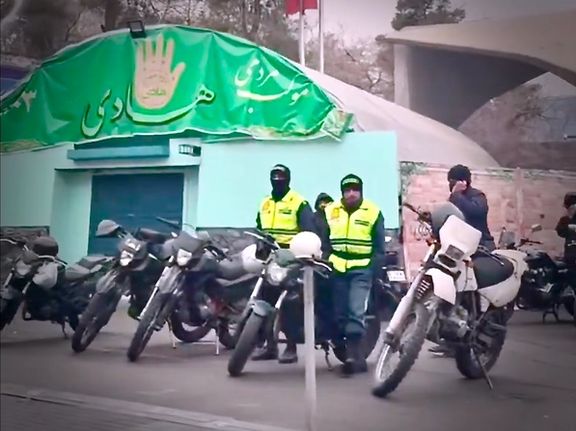Dozens arrested protesting continued house arrest of 2009 protests leaders

Iran's security forces on Thursday arrested dozens who gathered in central Tehran to protest the ongoing house arrest of the 2009 Green Movement leaders.
The protest was called to demand an end to the incarceration of former prime minister and presidential candidate Mir-Hossein Mousavi and his wife, Zahra Rahnavard, held in their home since February 2011.
It was the first such public demonstration since the couple were effectively jailed alongside the other 2009 leader, former parliamentary speaker Mehdi Karroubi, who also rejected the results of Iran's election that year.
Marking the 14th anniversary of the day the house arrest began, several hundreds gathered in Tehran for a "silent rally" that had been called a couple of days earlier by dissident activist Rahim Ghomeishi, a 60-year-old former IRGC member and Iran-Iraq War veteran who had spent four years as a prisoner of war in Iraq.
Ghomeishi was detained on Wednesday along with two other activists who had backed his call to action, Akbar Danesh-Sararoudi and Naser Daneshfar.
Their social media campaign received backing from over 500 former IRGC members, war veterans, and their families, who joined a few thousand for the silent protest on Thursday, according to the organizers.
Shortly after, Iran's security forces who had been stationed in and around the announced location arrested dozens including known activists and ordinary citizens.
Crackdown, arrests, and intimidation
On Thursday, Ardshir Amir-Arjomand, a former Mousavi advisor and spokesman for the Iranian Green Movement’s Coordinating Council, claimed that security forces blocked several activists from leaving their homes to participate in the rally.
Ghomeishi had previously announced that he and other veterans planned to stage a peaceful, “silent” protest outside the main gate of Tehran University to oppose the continued house arrest of political figures and the imprisonment of activists.
He also insisted that the law allows citizens to protest peacefully whenever they wish, and authorities cannot deny this right to them under the pretext that the country is in “sensitive circumstances” or that the “enemy” may exploit their protests for its own propaganda purposes.
Ghomeishi also said the group had informed the Interior Ministry and “other official bodies” of the intention to hold a rally but had not heard back from them, assuming that there was no objection to the plan.
While Article 27 of Iran’s constitution technically allows peaceful assembly, authorities almost categorically deny permits for opposition protests, citing “sensitive circumstances” or the risk of “enemy propaganda” or ignore their permit requests. At the same time, pro-regime vigilante groups face no such restrictions.
Assembly permits are often denied to most political groups, effectively suppressing their protests. In contrast, hardliner vigilante groups are allowed to hold rallies freely, without authorization.
After Thursday's crackdown, Azar Mansouri, the head of the Reformist Front, protested in an X post.
He wrote: "Why do some people freely hold gatherings and meetings anywhere ... without permission, chant slogans against the president and his team, and have ironclad immunity, but another group, who happen to be veterans of the country, are arrested before holding a peaceful gathering?"
Information received from Iranians on the ground by Iran International TV on Thursday and eyewitness reports on social media, described a heavy security presence on Enghelab Avenue and around Tehran University hours before the planned demonstration. Videos showed police cars and vans lining the streets.
One witness told Iran International that around 1,000 uniformed officers—including both male and female forces—were stationed near the university, along with nearly as many plainclothes agents. Officers stopped and searched people, checking their phones for footage.
Iran International has learned that the government’s Information office instructed local media and journalists not to report on the crackdown.
In addition to the initial arrests, several university students and Saeed and Saeedeh Montazeri—children of the late dissident cleric Ayatollah Hossein-Ali Montazeri— and Hossein Loghmanian, a former lawmaker and also a war veteran, were detained when they attempted to join the rally.
The case has gained international attention. Back in 2017, the US State Department said of the pair's house arrest: "Their continued house arrest contradicts Iran’s international obligations including those under the International Covenant on Civil and Political Rights, to which Iran is a state party, to provide minimum fair trial guarantees and not to subject citizens to arbitrary arrest or detention.
"We join the international community in condemning the continued arbitrary detention of these three individuals without charges or fair trials and in calling for their immediate release."